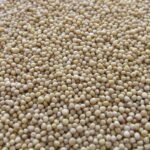Tiny but mighty, sesame seeds pack a punch far beyond their size. This nutritional treasure trove has much to offer, from promoting healthy skin to boosting heart health.
Sesame Seeds: Where Do They Come From?
Where did the journey of these tiny seeds begin? The origins of sesame seeds trace back to Africa and India, where they’ve been cultivated for over 3,000 years. Ancient civilizations recognized the oil-rich seeds for their culinary and medicinal value.
These golden nuggets of nutrition spread throughout the Middle East, Asia, and eventually across the globe. From the hanging gardens of Babylon to the bazaars of Persia, sesame seeds have seasoned our history and our dishes.
Culinary Uses of Sesame Seeds
Oh, the places sesame seeds can go in your kitchen! From tiny seeds, mighty flavors grow. They’re sprinkled atop buns, swirled into hummus, crushed into tahini, and blended into dressings.

Sesame seeds have a unique, nutty flavor that intensifies when toasted. Black, white, or brown, each variant brings a different layer to your dish. From adding a crunch to your salads to enhancing your stir-fries, they’re a versatile addition to your pantry.
Nutritional Values and Benefits of Sesame Seeds
They might be small, but boy do they pack a nutritional wallop! Let’s peek under the hood and check out the nutritional profile of these mighty morsels.
| Nutrients | Per 100g of Sesame Seeds |
|---|---|
| Calories | 573 |
| Protein | 18g |
| Fat | 50g |
| Carbohydrates | 23g |
| Dietary Fiber | 12g |
| Calcium | 975mg |
| Iron | 14.55mg |
Sesame seeds are a veritable treasure trove of nutrients. They’re teeming with healthy fats, proteins, B vitamins, minerals, fiber, and antioxidants. Additionally, they’re one of the richest plant sources of calcium. So, from your bones to your heart, sesame seeds have got you covered!
Frequently Asked Questions
Are sesame seeds good for weight loss?
Absolutely! The high fiber and protein content in sesame seeds can help control hunger, making them a great addition to a weight loss diet. Remember, moderation is key.
Can people with nut allergies eat sesame seeds?
It depends on the individual. Some people with nut allergies may also be allergic to sesame seeds. It’s best to consult a healthcare professional before trying them.
Did You Know?
- Despite their small size, sesame seeds are a powerhouse of nutrients and one of the oldest oilseed crops in the world.
- Open sesame! The phrase from the tale “Ali Baba and the Forty Thieves” refers to the sesame seed pod, which bursts open when it reaches maturity.
- In some cultures, sesame seeds symbolize immortality.
Parting Thoughts
So there you have it! The humble sesame seed is a giant in the world of nutrition. It’s a small step to include these tiny seeds in your diet, but it could be a giant leap for your health. So why wait? Sprinkle some sesame magic on your meals today!
Stay tuned for more nutritional nuggets and remember, good health starts from the inside out!
Source: PubMed




